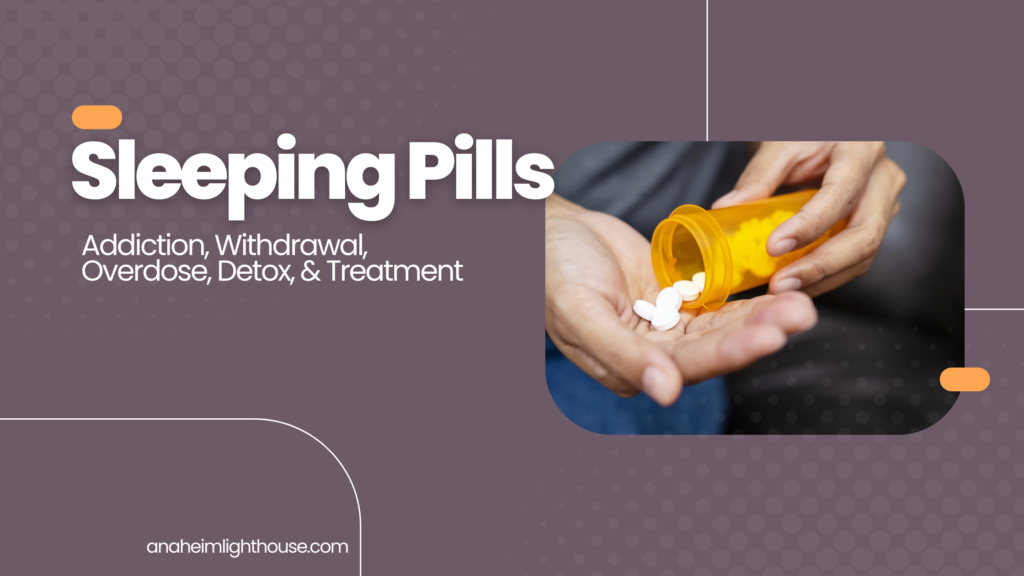Sleeping Pills: Side Effects, Addiction, Overdose & Treatment
Are you one of the many people who rely on sleeping pills to get a good night’s sleep? You’re not alone. Millions of American adults report using sleep aids. While these medications can be helpful for some people, they can also be addictive and lead to serious health problems if not used properly.
This blog post will explore sleeping pills and offer advice on how to safely take them if needed. We will also offer information on the dangers of addiction, withdrawal, overdose, and detox.
What Are Sleeping Pills?
Sleeping pills are substances under the sedative-hypnotic class. Other substances under this class include alcohols, benzodiazepines, and barbiturates. In general, there are two types of sleeping pills, that is, over-the-counter and prescription types.
These drugs are known by other medical and street names. Other medical names for sleeping pills include sleep-wake cycle modifiers, GABA medications, and tricyclic antidepressants.
Meanwhile, in the streets, they are more commonly known by the names sleepers, totem poles, tranks, zombie pills, and candy pills.
What Do Sleeping Pills Look Like?
In the market, these drugs are sold in various forms, commonly in capsules and tablets. However, some are sold as spray-type products like Zolpimist.
Like other medications, these drugs appear in different colors, pill identifiers, and some even have holes in their center. Its pill identifier typically includes weight in milligrams and brand name.
What Are Sleeping Pills Used For?
As the name suggests, sleeping pills are commonly used to treat insomnia and other sleep disorders. Insomnia is a condition where people find it hard to sleep or stay asleep for long periods.
If you are someone who regularly experiences difficulty sleeping, you may be advised by your doctor to take sleeping pills. These drugs can help you fall asleep faster and stay asleep for a longer period.
How Do Sleeping Pills Work?
Both over-the-counter and prescription types share the general effect of inducing drowsiness to promote sleep. However, there is a slight difference in terms of active component and operation between the two classifications.
For the active ingredient, over-the-counter types have an antihistamine component to induce sleepiness while the prescription one utilizes a nonbenzodiazepine component to induce a similar effect.
In terms of their operation, there are two sites in the brain where these active components work. The active component of the prescription type binds to the GABA receptor site of the central nervous system. The GABA site is responsible for releasing the GABA neurochemicals which slow down brain activity and induce relaxation.
In contrast, the active component of the over-the-counter type binds to the histamine receptor site to stop allergic symptoms. Sleepiness or drowsiness is one of the side effects of this process which is beneficial to those having sleeping problems.
How Long Before You Can Feel the Effects of Sleeping Pills?
There are different kinds of medications for sleeping pills and each has a corresponding duration of effects. For instance, Rozerem alters the sleep-wake cycle and has a duration effect of 4 to 6 hours.
Meanwhile, selective GABA drugs such as Sonata, Lunesta, and Ambien have effects lasting for around 6 to 8 hours. Other examples, like Diphenhydramine, contain an antihistamine as an active component that works for around 4 to 6 hours. Generally, you can feel the effects of sleeping pills after 30 minutes to 1 hour
How Long Do Sleeping Pills Stay In Your System?
Many sleeping pills have short half-lives. This means that they are quickly eliminated from the system.
Most sleeping pills will not stay in your system for more than 2 to 3 days. However, this will still depend on several factors like how long you have been taking the drug, your metabolism, and other health conditions.A hair test, for instance, may detect a sleeping pill for 1 month to 3 months.
What are the Short and Long-term Effects of Sleeping Pills?
When a person starts taking these medications, they may experience the following: stomach pains, dry mouth, dizziness, and changes in eating habits.
Meanwhile, using and taking higher doses of the drug can have serious health consequences in the long run. Some of the obvious health impacts of long-term abuse include slight memory loss, chest pain, narcolepsy, unpleasant dreams, and tremors.
Are Sleeping Pills Addictive?
The Drug Enforcement Agency classified these medications under Schedule IV controlled substances. People who take these medications without a prescription and any control are more likely to become addicted to them.
These medications have a lower risk of addiction, but if someone takes them continuously without a prescription, they may build up a tolerance to them and need to take more and more of the drug to feel the same effects.
These substances might not be as dangerous as drugs like meth, heroin, and cocaine, but they can still be very dangerous. People can get addicted to them and not even know it. This is because they can’t tell how much they’re taking and how tolerant they are. If someone takes too much of these substances, they can experience severe health consequences like a slow reaction to stimuli, intense sadness, hypotension, paralysis, suicidal behavior, and respiratory failure.
What Are the Withdrawal Symptoms?
When someone cuts back or stops using these drugs, they may experience physical and behavioral withdrawal symptoms.
Some common withdrawal symptoms include a lower heartbeat, excessive sweating, uncontrolled body shaking, muscle pains, and being highly irritable.
What Causes Sleeping Pill Overdose? Signs of an Overdose
Overdose usually happens when someone takes more of the drug than what is recommended. It can also happen if someone accidentally or purposely takes someone else’s medication.
Common signs of an overdose include low energy or enthusiasm, tired body, slow reflexes, difficulty breathing, and frequent stomach pain.
What Should You Do If Someone Is Overdosing?
People who overdose on these substances can be treated with certain steps and medication. The first thing you need to do is check their pulse rate and heartbeat. This will help make sure their heart is working properly.
People who overdose on these substances often have trouble breathing. To help them breathe, you should not let them wear tight clothes. These drugs also lower blood pressure, which can be dangerous if it keeps dropping.
Call emergency services immediately if someone has overdosed on sleeping pills.
How Do You Treat Sleeping Pill Addiction? Detox & Treatment
Sleep medication addiction is a serious problem. Detoxing from sleep medication can be difficult and dangerous, so it’s best to do it in a professional setting.
Professional addiction treatment centers can provide you with the necessary resources for safe and successful detox.
Treatment for sleeping pill addiction typically includes residential or outpatient rehab, therapy, and support groups. Many excellent addiction treatment programs can help you detox from sleeping pills safely and effectively.
Final Thoughts: Addressing Sleeping Pill Abuse and Addiction
If you or someone you love is abusing sleeping pills, it’s important to get help as soon as possible. Sleeping pill abuse can lead to serious health problems and even death.
There are many excellent treatment options available that can help you detox from these drugs safely and effectively. If you need help finding a treatment center, call us today.
















